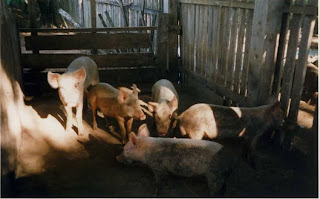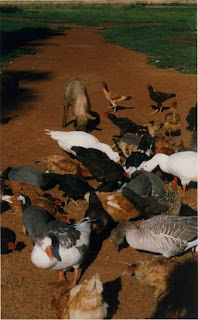 Portraits of four animal activists
Portraits of four animal activistsWhat inspires and motivates people to be animal rights activists and vegans? Until I interviewed four young American activists I had not realized just how intimate--and necessary--the connection is between the vegan and animal movements.
Although I know quite a number of vegetarians, I know rather few vegans. I’m aware of course that neither vegans nor vegetarians (although there’s also the puzzling concept of “almost vegetarian”) eat meat but there’s always been something rather mysterious about those who chose the vegan way: in my mind they were somehow more exotic, more serious, more disciplined, perhaps more ascetic, more willing to put up with deprivation. Or so I thought. I didn’t understand until I interviewed the four "superstar" activists for my radio program Tidings from Hazel Kahan that veganism is actually the linchpin of the animal movement. If you’re serious about protecting the rights of animals, especially the rights of farm animals, that
 is animals who are farmed for food, then you would find it difficult to argue against the logic of being a vegan.
is animals who are farmed for food, then you would find it difficult to argue against the logic of being a vegan.Being an activist in the animal protection movement means not only protesting—and protecting-- the way farm animals are born, raised and killed, but also making explicit the profound connections between factory farming and our own health, the health of the environment, the health of workers and, last but not least, the ethics on which our society is based.

The four people whose stories I heard had all developed a compassionate consciousness of animal suffering when they were much younger. Often without the benefit of support from family or their peers, this compassion led them not only to make life-long food choices but also to a belief that these choices could make a difference. All of them are now leaders in the broader animal movement, shaping it through advocacy, legislation, undercover investigative work, outreach in national and international organizations as well as the forming of new organizations.

I have been inspired and moved by the ways in which they have integrated their values into their lives and their work. I hope you will be too.
Each of the activists I spoke with can recall exactly when and how they had their first awakening about animal suffering. When they talk about it, their memories have the feel of an epiphany, the day on which their lives were changed--it may have been a teacher, a video, a book or a conversation.
One of the myths about vegans is that their diet is boring at best, that they are malnourished at worst. Listen to these interviews and you will hear that myth debunked with dispatch! Rather than a marginal counter-culture phenomenon, veganism is growing and entering the main stream and general consumer consciousness. Although conclusive research evidence is difficult to come by, the capitalist proof lies in the capitalist pudding: greater demand has led to greater supply so that more products are now available in more places. If further proof is needed, Oprah herself has announced that she is embarking on a three-week vegan experience.

Fundamental to the animal protection movement is a strong sense of injustice tempered by compassion. Other vegans have told me that for them the suffering of animals is so palpable that they believe that by eating meat they are actually ingesting the suffering into their own beings. I was curious to see if such thinking was shared by these activists and if they also saw participation in animal abuse—witting or unwitting—as somehow staining our entire society. Although this may not use quite those words, they are passionately logical about the ethical ramifications of animal suffering and food choices that create and extend such suffering.
Although the various groups within the animal movement differ in emphasis and style and connotation, they are bound as witnesses by the documented horror of animal suffering and their belief that a vegan diet makes an important contribution to change. This is an energetic movement, galvanized by exchange of people from one organization to another, the forming of new groups and organizations, increased collaboration, the relative youth of its members and the increasing salience of its vision on the broader planetary stage.
Perhaps it’s time to think about why we aren’t all vegans already!
 Podcasts of the two-part program are available: Part 1 and Part 2
Podcasts of the two-part program are available: Part 1 and Part 2Please visit their websites to learn more about these activists and their work: Nora Kramer www.humanecalifornia.org, Nathan Runkle www.mercyforanimals.org, Lauren Ornelas www.foodispower.org and Paul Shapiro www.hsus.org.
**************
Interviews with the four activists were broadcast on June 26, 2008 and July 3, 2008 on WPKN 89.5 fm Bridgeport and 88.7 Montauk, totally independent and listener-supported radio stations. This and all other Tidings from Hazel Kahan programs are produced by Tony Ernst..**************
The four larger photos: cockerel, pigs, sheep and chickens were taken by me in Paraguay and Guernsey! The two smaller ones are web downloads.

